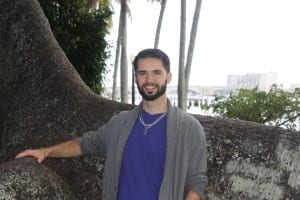 Daniel’s Story
Daniel’s Story
Not everyone believes in second chances. But Daniel Cadorette and Theresa Gold know they exist after the family’s loss eventually led to new hope for life.
Cadorette, a 22-year-old Palm Beach Atlantic University student, from Snellville, Georgia, was raised in a loving home.
“My mom was always very involved in my life,” Cadorette recalls of his mother with whom he had a close relationship.
But life began to change for Cadorette’s family when his parents decided to file for divorce in 2004.
It was an emotional year for Cadorette and his younger sister, Isabelle. “At times, I felt [the separation] was my fault,” he said. “Most times I felt angry.”
Cadorette was not the only one deeply affected by his parent’s decision. His mother also faced challenges and turned to drugs in an effort to cope.
“I believe that her addiction was what she leaned on in her time of suffering through the divorce,” Cadorette said.
And when the stress became too much for Cadorette’s mother on the night before the divorce hearing, she suffered a heart attack and tragically passed away while Cadorette was at a friend’s house.
“I experienced many emotions—anger, confusion, sadness,” Cadorette remembers.
“I believed that had [my parents] worked out their problems [my mother] would have never experienced the stress she was under and would have never had a heart attack,” he continued.
But it was the feeling of guilt that haunted Cadorette for many years following his mother’s passing. “I blamed myself for not being there,” on the night she passed away, he said.
Theresa’s story
Theresa Gold, his aunt, quickly and willingly became the mother figure to Cadorette and his sister following their mother’s death.
“My grandmother was continually there for me, as well as my aunt,” said Cadorette.
It was never a burden, however, for Gold to take care of her niece and nephew, even though she was also experiencing grief of her own—the loss of her sister. But it was living with kidney disease that made life challenging for her.
At ten-years-old, Gold was diagnosed with post-streptococcal glomerulonephritis. “It’s kidney disease caused from strep throat that goes into your body,” Gold said.
While it is uncommon to develop post-streptococcal GN today, Gold’s “childhood was extremely affected.”
Due to treatment, Gold missed one year of school and was homeschooled. But with medication and bed rest, she was able to live a normal life after her kidneys healed.
In 1990, however, Gold’s kidneys relapsed again but began to function normally with medication.
“Then in 1999, they went into complete failure,” Gold said. “Scar tissue had formed over the years and I was put on dialysis in New York.”
Gold’s first kidney transplant in 2004 was from an 80-year-old cadaver donor. “There were complications with that surgery,” said Gold.
But the kidney lasted for the next ten years. It was not until June 2013 that Gold was hospitalized with kidney failure and had to begin dialysis. Upon hearing the news, Cadorette knew what he wanted to do—donate a kidney to his aunt.
“My aunt needed something,” said Cadorette. “And I had what she needed.”
The gift they gave each other
Already knowing that he and Gold shared the same blood type, Cadorette called the kidney transplant center and applied to be a living donor. Once it was determined that Cadorette was the perfect match for Gold, tests, evaluations, and conversations with anesthesiologists and financial coordinators took place.
“The process was long,” Cadorette said. The first interview began in July 2013.
Transplant day finally arrived on February 11, 2014. Cadorette and his Aunt Terri were admitted to Emory University Hospital in Atlanta, Georgia on that morning.
“I wasn’t scared,” said Cadorette. “I knew God was there the whole time.”
The entire procedure took about three hours. “My aunt went into operation about an hour after me,” said Cadorette. “By the time they put the kidney in my aunt, they were stitching me up.”
With nearly 100,000 people on the kidney transplant waiting list and an average wait time of four years, Cadorette’s willingness to donate a kidney to his aunt “was just very special,” said Sonia Benenati, Cadorette’s and Gold’s transplant nurse at the hospital.
“We have living donors,” Benenati continued. “But for someone to come so young and donate—it was just very special.”
And while the procedure was flawless, more than just an organ transplant occurred that day, a second chance at life was also exchanged.
Gold looks forward to finally having the time to go back to school. And Cadorette, who lived with years of guilt, feeling that he could have saved his mother’s life, can now live a life of peace, knowing that he did, in fact, save someone’s life after all.
Questions or interested in donating a kidney? Contact Emory Kidney Transplant Program at 1-800-75-EMORY.
Chrissie Ferguson is a freelance writer and the mother of three young boys. She is also the director of children’s ministries at the Royal Poinciana Chapel in Palm Beach, Florida. Read her mom blog at soundoflittlefeet.blogspot.com

Comments